Geschiedenis van het Christendom 1. De vroege dagen van het Christendom
Voorgaand: 1.1. Eerste Eeuw van het Christendom
1.2. Aanzien als een gevaar
1.2.1. Positie en macht
De stichter van het christendom, Jezus uit Nazareth[1], de Christus, bad dat er eenheid onder zijn volgelingen mocht bestaan (Johannes 17:21), en er was de apostelen zeer veel aan gelegen de eenheid van de christelijke gemeente te bewaren (1 Korinthiërs 1:10; Judas 17-19), maar al in de eerste eeuw kwam er vals onderwijs in het christendom.
Het feit, dat de Christenen een dicht verenigd lichaam waren, vers, krachtig, hoopvol, en dagelijks toenemend, terwijl heidenen grotendeels een losse samenvoeging waren, dagelijks verminderend, maakte dit de ware prospectieve sterkte van de kerk veel groter. Maar zij bleven sterk omringd door allerlei verscheiden heidense geloofsvormen en populaire activiteiten die soms zeer verleidelijk konden zijn.
Met het verstrijken der jaren kwamen de Christenen voor allerlei beproevingen en vervolging te staan. Net als die eerste discipelen putten zij vertroosting en aanmoediging uit hun samenkomsten. Bijgevolg schreef de apostel[2] Paulus in Hebreeën 10:24, 25: „Laten wij op elkaar letten ten einde tot liefde en voortreffelijke werken aan te sporen, het onderling vergaderen niet nalatend, zoals voor sommigen gebruikelijk is, maar laten wij elkaar aanmoedigen, en dat te meer naarmate gij de dag ziet naderen.” Die woorden zijn veel meer dan een gebod om bijeen te blijven komen. Ze verschaffen een door God geïnspireerde norm die voor alle christelijke vergaderingen geldt — en eigenlijk voor elke gelegenheid dat Christenen bijeenzijn.
De apostelen waren er bewust van dat onenigheid in het geloof tot heftig geredetwist, tweespalt en zelfs vijandschap kon leiden. (Vergelijk Handelingen van de Apostelen 23:7-10.) De apostels en de vroeggeïnspireerde mensen van de eerste eeuw verdedigden het Christelijke geloof op twee manieren: mondeling (Handelingen 22.1, Filippenzen 1.7, 16, 2 Timotheüs. 4.16) en door middel van literatuur (1 Korintiërs. 9.3). Al in hun tijd moesten de apostelen de aanhangers van Christus voor valse leraren en het verkeerde onderwijs waarschuwen welke reeds het geloof in de eerste eeuw langzaam binnendrongen.
De apostel Johannes weerlegde de misvattingen van hoe te goddelijk te leven in aanwezigheid van de docetic-gnostische leraren die de kerk infiltreerden (1 Johannes 2.1). „ Er zijn veel verleiders of dwaalleraars tot de wereld uitgegaan; die niet belijden dat Yahshua/Jezus de Messias in het vlees is gekomen. Dit is verleider en een antichrist.“ (2 Johannes 1:7) „omdat een aantal valse leraren in de wereld zijn uitgegaan, die geen getuigenis geven dat Jezus Christus in het vlees kwam. Zulk één is een valse leraar en een Antichrist.“ (2 Johannes 1:7)
Petrus schrijft: „Maar er waren ook valse profeten onder de mensen, zelfs aangezien er valse leraren onder u zullen zijn, die in het geheim in afgrijselijke ketterijen zullen brengen, zelfs ontkennend dat de heer hen kocht, en op zich vlugge vernietiging zullen brengen” (2 Petrus 2:1) „vooral hen die hun oude aard volgen in verlangen voor vuiligheid en wie gezag verachten. Vermetel en verwaand, zonder blikken of blozen, schromen zij niet de hemelse machten te beschimpen. En beven deze valse leraren niet bij het beledigen van engelachtige wezens; “ (2 Petrus 2:10)
Niemand van echt belang wil verkeerd zijn op wat de Bijbel onderwijst. Daarom moeten wij voorzichtig en bereid zijn om al het Bijbels bewijsmateriaal zo langzaam of zo snel te zien als het geanalyseerd kan worden. In principe, is het wat wij in de instructie van Paulus aan de bewoners van Thessaloniki vinden: „Doof niet de Geest. Veracht het profeteren niet. Bewijs alle dingen; houdt vast aan alles dat goed is. Onthoudt u of houdt u ver van al de verschijningen van kwaad.“ (1 Thessalonicenzen 5:19 – 22)
Verblijvend in de woorden van het Evangelie (Johannes 8.31-32) moeten wij geduldig zijn, hopend om de gift van de Heilige Geest te ontvangen, en de Bijbelse feiten zichzelf laten openbaren onder hun eigen voorwaarden. Aan dat geduld ontbrak het enkele vroege Christenen, alsook vonden zij het niet aangenaam om hun oude gewoonten zo maar op te geven. Zij werden toen aangetrokken door hen die vonden dat het niet zo belangrijk was om zo strikt aan alles te houden.

Het Romeinse Rijk
Zolang de apostelen nog leefden, beschermden zij de gemeente. De geschiedenis getuigt dat de vroege christenen niet betrokken waren bij de politieke aangelegenheden van het Romeinse Rijk en dat zij geen vooraanstaande klasse van geestelijken hadden. In plaats daarvan waren zij ijverige verkondigers van Gods koninkrijk. Tegen het einde van de eerste eeuw hadden zij getuigenis gegeven in alle delen van het Romeinse Rijk en discipelen gemaakt in Azië, Europa en Noord-Afrika. (Kolossenzen 1:23). Deze verrichtingen in de prediking betekenden echter niet dat het niet langer noodzakelijk was geestelijk waakzaam te blijven. Jezus’ voorzegde komst lag nog ver in de toekomst.
Sekten moesten dus vermeden worden, aangezien ze tot de werken van het vlees behoorden (Galaten 5:19-21). Christenen werden vermaand geen sekten te bevorderen noch zich door valse leraren op een dwaalspoor te laten brengen (Handelingen der Apostelen 20:28; 2 Timotheüs 2:17, 18; 2 Petrus 2:1). In zijn brief aan Titus gebood de apostel Paulus dat een mens die er na een eerste en een tweede ernstige vermaning mee bleef voortgaan een sekte te bevorderen, verworpen moest worden, wat blijkbaar betekende dat hij uit de gemeente gesloten moest worden (Titus 3:10). Degenen die weigerden betrokken te raken bij het veroorzaken van verdeeldheid binnen de gemeente of bij het ondersteunen van een bepaalde partij, zouden zich door hun trouwe wandel onderscheiden en er blijk van geven Gods goedkeuring te bezitten. Dit bedoelde Paulus blijkbaar toen hij tot de Korinthiërs zei: „Er moeten ook sekten onder u zijn, opdat de goedgekeurden onder u ook openbaar mogen worden.” (1 Korinthiërs 11:19).
De christenen hielden er hoge beginselen van moraliteit en rechtschapenheid op na, en met vurige ijver maakten zij een hoopgevende boodschap bekend. Duizenden verlieten het judaïsme en aanvaardden het christendom (Handelingen 2:41; 4:4; 6:7). In de ogen van de joodse religieuze leiders waren Jezus’ joodse discipelen louter afvalligen. (Vergelijk Handelingen 13:45.) Deze woedende leiders waren van mening dat het christendom hun tradities teniet deed. Ja, het loochende zelfs de kijk die zij op heidenen hadden! Vanaf 36 G.T. konden heidenen christenen worden en zich in hetzelfde geloof en dezelfde voorrechten verheugen als joodse christenen. (Handelingen 10:34, 35).

Christelijke martelaars
Wegens hun hoge moraliteitsbeginselen en het vasthouden aan hun geloofsovertuiging op meerdere gebieden werden de Christenen in de Romeinse wereld niet geliefd. Hun afgescheiden van de wereld (Johannes 15:19) riep aversie op. Zij bekleedden dus geen politiek ambt en weigerden militaire dienst. Als gevolg hiervan „werden [zij] voorgesteld als mensen die dood waren voor de wereld, en onbruikbaar voor alle aangelegenheden van het leven”, aldus de geschiedschrijver August Neander. Geen deel van de wereld zijn, betekende ook de goddeloze wegen van de verdorven Romeinse wereld mijden. „De kleine Christengemeenschappen stoorden de pleziermakende heidense wereld met hun vroomheid en fatsoen”, legt de geschiedschrijver Will Durant uit (1 Petrus 4:3, 4). Door christenen te vervolgen en terecht te stellen, hebben de Romeinen misschien wel geprobeerd de kwellende stem van het geweten tot zwijgen te brengen.
De eerste-eeuwse christenen predikten het goede nieuws van Gods koninkrijk met onwankelbare ijver (Mattheüs 24:14). Omstreeks 60 G.T. kon Paulus zeggen dat het goede nieuws ’in heel de schepping die onder de hemel is, gepredikt’ was (Kolossenzen 1:23). Tegen het einde van de eerste eeuw hadden Jezus’ volgelingen discipelen gemaakt in het hele Romeinse Rijk — in Azië, Europa en Afrika! Zelfs sommige leden van „het huis van caesar” werden christenen (Filippenzen 4:22). Deze ijverige prediking wekte wrevel. Neander zegt: ’Het christendom maakte gestadig vorderingen onder mensen uit alle lagen van de bevolking en dreigde de staatsreligie ten val te brengen.’ U kan zich voorstellen hoe belangrijk het wel kon zijn om toch mensen te laten infiltreren om hen op andere gedachten te laten brengen.
Jezus’ volgelingen (of aanhangers van Christus) schonken Jehovah exclusieve toewijding (Mattheüs 4:8-10). Misschien bracht dit aspect van hun aanbidding hen meer dan wat anders in conflict met Rome. De Romeinen waren tolerant ten aanzien van andere religies, zolang hun aanhangers ook deelnamen aan de keizeraanbidding. De vroege christenen konden gewoon niet aan een dergelijke aanbidding deelnemen. Zij bezagen zich als personen die rekenschap verschuldigd waren aan een autoriteit die hoger was dan die van de Romeinse staat, namelijk Jehovah God (Handelingen 5:29). Als gevolg hiervan werd een christen, ook al was hij verder in alle opzichten nog een zodanig voorbeeldige burger, als een staatsvijand beschouwd.
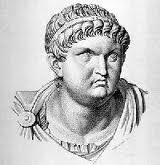
Keizer Nero
Er was nog een reden waarom getrouwe christenen in de Romeinse wereld „voorwerpen van haat” werden: Gemene laster over hen werd grif geloofd, beschuldigingen waarvoor de joodse religieuze leiders in niet geringe mate verantwoordelijk waren (Handelingen 17:5-8). Omstreeks 60 of 61 G.T., toen Paulus in Rome op zijn berechting door keizer Nero wachtte, zeiden vooraanstaande joden over christenen: „Werkelijk, wat deze sekte aangaat, het is ons bekend dat ze overal tegenspraak ondervindt” (Handelingen 28:22). Nero zal beslist lasterlijke verhalen over hen gehoord hebben. In 64 G.T. koos hij, toen men hem voor de brand die Rome teisterde verantwoordelijk hield, naar verluidt de reeds alom belasterde christenen als zondebokken uit. Dit schijnt een golf van gewelddadige vervolging teweeggebracht te hebben, die ten doel had de christenen uit te roeien.[3]
De valse beschuldigingen die tegen de christenen werden ingebracht, kwamen vaak neer op een mengsel van regelrechte leugens en een verdraaiing van hun geloofsopvattingen. Omdat zij monotheïstisch waren en niet de keizer aanbaden, werden zij als atheïstisch bestempeld. Omdat sommige niet-christelijke gezinsleden hun christelijke familieleden tegenstonden, werden christenen ervan beschuldigd gezinnen te ontwrichten (Mattheüs 10:21). Zij werden voor kannibalen uitgemaakt, een beschuldiging die volgens sommige bronnen was gebaseerd op een verdraaiing van de woorden die Jezus tijdens het Avondmaal des Heren had geuit. (Mattheüs 26:26-28).
Tegen het eind van Nero’s regeerperiode werden de Christenen, onder de zwaarste sancties, zelfs dat van dood, vereist om offers aan de keizer en aan heidense goden aan te bieden. Na de dood van Nero hield de vervolging op, en de aanhangers van Jezus genoten van een tamelijke vrede tot Domitiaan, een keizer van vergelijkbare verdorvenheid als Nero regeerde
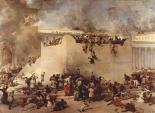
Verwoesting Tempel Jeruzalem
De verspreiding van de Joden, en de totale vernietiging van hun stad en tempel in 70 G.T, zijn de volgende gebeurtenissen van overweging in de rest van de eerste eeuw. De aantallen die onder Vespasian in het land verdwenen, en onder Titus in de stad, van 67-70 G.T. omkwamen door hongersnood, de interne facties, en het Romeinse zwaard, liepen op tot één miljoen drie honderd vijftig duizend vier honderd zestig, naast honderd duizend verkocht in de slavernij.[4]
Eusebius, de vader van geestelijke geschiedenis schrijft dat nadat Domitianus tegen velen zijn wreedheid had uitgeoefend, en onterecht had gedood waaronder geen klein aantal edele en belangrijke mensen in Rome, en, zonder oorzaak, die enorme aantallen eerbare mensen met ballingschap en de inbeslagneming van hun bezit heeft gestraft, zich vestigde als uitvoerig opvolger van Nero in zijn haat en vijandigheid aan God.[5] Hij volgde ook Nero in het tarten van hen. Hij beval dat zijn eigen standbeeld zou worden aanbeden als een god, herzag de wet van verraad, en omringde zich met spionnen en informanten om een tweede vervolging van de Christenen teweeg te brengen.

Roman statue of Artemis - NYC Metropolitan Museum of Art
Niettegenstaande de Romeinse keizers, Romeinse gevangenissen en Romeinse executies slaagde het christendom er in om toch een stille opmars te maken. In weinig meer dan zeventig jaar na de dood van Christus, had het dergelijke snelle vooruitgang geboekt in sommige plaatsen om de val van heidendom te bedreigen. Christenen haalden zich meer en meer de haat van heidense aanbidders op de hals. Zo was in het oude Efeze het vervaardigen van zilveren tempeltjes van de godin Artemis een winstgevend bedrijf. Maar toen Paulus daar predikte, reageerde een aanzienlijk aantal Efeziërs hier gunstig op en keerden zij de aanbidding van Artemis de rug toe. Nu hun handel werd bedreigd, veroorzaakten de zilversmeden een volksoploop (Handelingen 19:24-41). Iets overeenkomstigs deed zich voor nadat het christendom zich tot in Bithynië (nu Noordwest-Turkije) had uitgebreid. Niet lang nadat de christelijke Griekse Geschriften waren voltooid, berichtte de bestuurder van Bithynië, Plinius de Jongere, dat heidense tempels werden verlaten en de verkoop van voer voor offerdieren drastisch terugliep. De christenen kregen de schuld — en werden vervolgd — omdat in hun aanbidding geen plaats was voor dierlijke slachtoffers en afgoden (Hebreeën 10:1-9; 1 Johannes 5:21). Het is duidelijk dat de verbreiding van het christendom invloed uitoefende op bepaalde gevestigde belangen die met heidense aanbidding verband hielden, en degenen die als gevolg hiervan zowel handel als inkomsten kwijtraakten, waren hier gebelgd over.
Door de vooruitgang van christendom werden de tijdelijke belangen van een groot aantal personen ernstig beïnvloed. Dit was een vruchtbare en bittere bron van vervolging. Heidense tempels werden meer en meer verlaten, de verering van de goden werd veronachtzaamd, en de slachtoffers voor offers werden zelden gekocht. Dit hief natuurlijk een populaire schreeuw tegen het christendom op, zoals er zich voor deed in Efeze: „ons ambacht is in gevaar tot niets teruggebracht te worden, en dat de tempel van de grote godin Diana zal worden veracht.“ Een talloze menigte van priesters, beeldhouwers, handelaars, waarzeggers, voorspellers, en vakmannen, vonden een goed leven met betrekking tot de verering van zo vele goden. Al dezen, zagen hun ambacht in gevaar, stegen in verenigde sterkte tegen de Christenen, en zochten op elke manier om de vooruitgang van christendom tegen te houden. De sluwe priesters en listige zieners en waarzeggers overreedden in het algemeen, gemakkelijk de gewone mensen, en overtuigden de openbare mening dat alle rampen, oorlogen, stormen, en ziekten die mensheid troffen, op hen door de boze goden werden verzonden, omdat de Christenen die hun gezag verachtten overal werden getolereerd.[6] Zij vonden en verspreidden de meest gemene lasterpraatjes tegen alles wat christelijk was en legden veel en erge klachten voor tegen de Christenen vóór de gouverneurs. Dit was vooral zo in de Aziatische provincies waar het christendom het meest overwegend was.
De eerste Christenen trokken zich natuurlijk van paganisme terug, hielden hun bijeenkomsten in het geheim en werden een afzonderlijke en verschillende groep van mensen. Zij konden zo het aanhangen van polytheïsme enkel maar veroordelen daar het volkomen tegengesteld was aan het ware leven en ware God, en aan het evangelie van Zijn Zoon Jezus Christus. Dit gaf de Romeinen de idee dat de Christenen aan het menselijke ras vijandig waren, doordat zij zagen dat zij alle godsdiensten, buiten de hunne, veroordeelden. Vandaar dat zij„Atheïsten“ werden genoemd omdat zij niet geloofden in heidense goden, en heidense verering verafschuwden.[7] Maar die afzondering van die heidense bevolking leek niet altijd even gemakkelijk.
[2] „apostel“ betekent vooruitgezondene.
[3] In de maand Juli 64 G.T. brak een grote brand uit in het Circus, welke zich bleef uitspreiden tot het al oude grandeur van de keizerstad in ruïnes legde. De vlammen breidden zich met grote snelheid uit door de kracht van de wind en door de lange smalle straten van Rome stad, over de heuvels en valleien. De algemene vuurzee. verpakte in een korte tijd de gehele stad in één blad verterende vlammen.
[4] Dean Milman’s History of the Jews, vol. 2, book 16, page 380
[5] Roman History, Encyclopedia Britannica, vol. 19, page 406
[6] Mosheim’s Ecclesiastical History, vol. 1, page 67. Cave’s Primitive Christianity; early chapters
 An amateur Brazilian writer invites readers to come along and to enjoy journeys with him and become his partner to build his blog together. He lives in the Olympic city, the famous Rio soon the Olympus, where a wall is standing so that the poor shall not be seen.
An amateur Brazilian writer invites readers to come along and to enjoy journeys with him and become his partner to build his blog together. He lives in the Olympic city, the famous Rio soon the Olympus, where a wall is standing so that the poor shall not be seen.








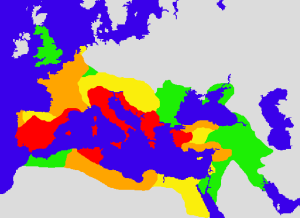
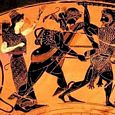
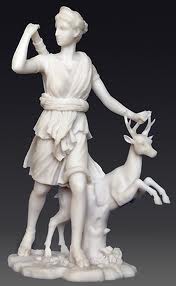







 Bijbelvorsers Webs
Bijbelvorsers Webs Belgische Vrije Christadelphians / Belgian Free Christadelphians – Old Google Main Website
Belgische Vrije Christadelphians / Belgian Free Christadelphians – Old Google Main Website Christadelphian Ecclesia
Christadelphian Ecclesia Hoop tot Leven – Redding in Christus
Hoop tot Leven – Redding in Christus
Recent Comments